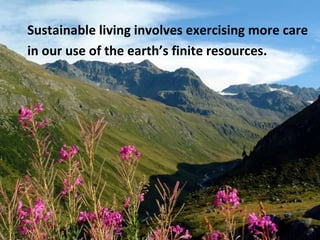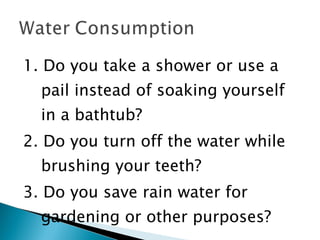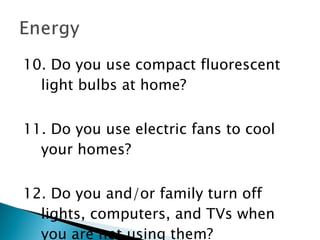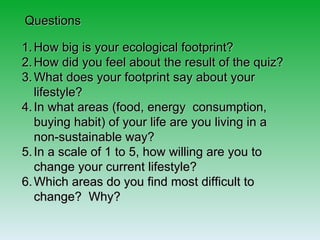Stepping lightly2
- 3. The way we use the earth’s resources has contributed to the social, cultural, economic, and environmental problems of the world today.
- 4. . However, our everyday decisions can be a big part of the solution if we adopt more environmentally sustainable lifestyles.
- 5. What do we mean by sustainable living ?
- 6. Living sustainably means living in a way that minimizes our negative impact on the planet and its resources to ensure equitable availability of resources for all around the world.
- 7. Sustainable living involves exercising more care in our use of the earth’s finite resources.
- 8. We humans have a huge impact on the environment by the choices we make in our daily living.
- 9. The food we eat the products we use, the way we dispose of them our buying habits … All have real impact on the health of our planet and its people.
- 10. involves meeting our needs without depleting the environmental, economic, and social resources that future generations will need.
- 11. We have the choice to make the world more or less sustainable by the way we live.
- 12. A sustainable lifestyle should not leave a big negative impact or “footprint” behind.
- 13. Ecological Footprint Quiz www.myfootprint.org
- 14. Always (1) Usually (2) Sometimes (3) Occasionally (4) Never (5)
- 15. 1. Do you take a shower or use a pail instead of soaking yourself in a bathtub? 2. Do you turn off the water while brushing your teeth? 3. Do you save rain water for gardening or other purposes?
- 16. 4. Do you recycle your newspapers and magazines? 5. Do you recycle your aluminum and/or steel cans? 6. Do you compost your kitchen and/or yard waste?
- 17. 7. Do you walk, ride your bicycle, take public transportation or a car pool to school and/or to activities? 8. Do walk, ride your bicycle, take public transportation or a car pool to school and/or to activities? 9. Do you walk, ride your bicycle, take public transportation or in a car pool to school and/or activities
- 18. 10. Do you use compact fluorescent light bulbs at home? 11. Do you use electric fans to cool your homes? 12. Do you and/or family turn off lights, computers, and TVs when you are not using them?
- 19. 13. Do you take food for meals in re-usable containers instead of throw-aways? 14. Do you grow fresh vegetables in a garden? 15. Do you eat fresh meat, vegetables, and fruits instead of “microwave-ready” meals?
- 20. 16. Do you purchase items made of recycled materials or with recycled packaging? 17. Do you buy only what you really need? 18. Do you give unwanted clothes and toys to someone who needs them?
- 21. Add your scores per section (there are six sections) Add the six sub-totals for your total score.
- 22. Look at your score and see how big an eco-footprint you have: 18-31 You are a model of how we should all live. Keep up the good work! 32-55 You are quickly on the road to eco-friendly living. 56-69 You are average like most people in the world. 70-80 Your consumption habits are wasteful. There are surely changes you can make. Start small and don’t give up. 81-90 If everyone lived this way, we would need at least FIVE (5) Earths to provide the necessary resources
- 23. Questions How big is your ecological footprint? How did you feel about the result of the quiz? What does your footprint say about your lifestyle? In what areas (food, energy consumption, buying habit) of your life are you living in a non-sustainable way? In a scale of 1 to 5, how willing are you to change your current lifestyle? Which areas do you find most difficult to change? Why?
- 24. An ecological footprint Is an indicator of environmental sustainability, a way to connect our behaviors with the impacts they have on our environment takes into account such things as energy use, water use, food sources, transportation, etc calculates how much “nature” is consumed from your everyday life choices and if planet can sustain this lifestyle
- 25. If everyone in the world were to live the way most people In the world live, it would take 5 planet earths to support human life.
- 26. Since we only have one home, our Earth, it is important to learn to “ step lightly” on the earth.
- 27. Review your eco-footprint results. What 5 sustainable lifestyle practices can you adopt in the following areas to reduce your eco-footprint on earth: Food Energy Water Buying habits Garbage boxfont.com
- 28. What are some ways your school can minimize its impact on the environment? How can you, as a student, contribute to this?
- 29. We all tread on the world, pressing down on it by the way we live. Some of us tread on the world heavily and leave a large footprint. Let us all step lightly on the earth If we really care for the next generation.
- 30. Thank You!






























